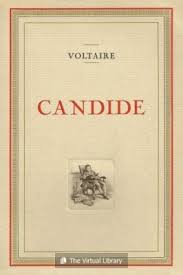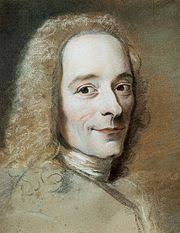Candide Page #2
Candide, ou l'Optimisme, is a French satire first published in 1759 by Voltaire, a philosopher of the Age of Enlightenment.
Candide, all stupefied, could not yet very well realise how he was a hero. He resolved one fine day in spring to go for a walk, marching straight before him, believing that it was a privilege of the human as well as of the animal species to make use of their legs as they pleased. He had advanced two leagues when he was overtaken by four others, heroes of six feet, who bound him and carried him to a dungeon. He was asked which he would like the best, to be whipped six-and-thirty times through all the regiment, or to receive at once twelve balls of lead in his brain. He vainly said that human will is free, and that he chose neither the one nor the other. He was forced to make a choice; he determined, in virtue of that gift of God called liberty, to run the gauntlet six-and-thirty times. He bore this twice. The regiment was composed of two thousand men; that composed for him four thousand strokes, which laid bare all his muscles and nerves, from the nape of his neck quite down to his rump. As they were going to proceed to a third whipping, Candide, able to bear no more, begged as a favour that they would be so good as to shoot him. He obtained this favour; they bandaged his eyes, and bade him kneel down. The King of the Bulgarians passed at this moment and ascertained the nature of the crime. As he had great talent, he understood from all that he learnt of Candide that he was a young metaphysician, extremely ignorant of the things of this world, and he accorded him his pardon with a clemency which will bring him praise in all the journals, and throughout all ages. An able surgeon cured Candide in three weeks by means of emollients taught by Dioscorides. He had already a little skin, and was able to march when the King of the Bulgarians gave battle to the King of the Abares.[2] III HOW CANDIDE MADE HIS ESCAPE FROM THE BULGARIANS, AND WHAT AFTERWARDS BECAME OF HIM. There was never anything so gallant, so spruce, so brilliant, and so well disposed as the two armies. Trumpets, fifes, hautboys, drums, and cannon made music such as Hell itself had never heard. The cannons first of all laid flat about six thousand men on each side; the muskets swept away from this best of worlds nine or ten thousand ruffians who infested its surface. The bayonet was also a sufficient reason for the death of several thousands. The whole might amount to thirty thousand souls. Candide, who trembled like a philosopher, hid himself as well as he could during this heroic butchery. At length, while the two kings were causing Te Deum to be sung each in his own camp, Candide resolved to go and reason elsewhere on effects and causes. He passed over heaps of dead and dying, and first reached a neighbouring village; it was in cinders, it was an Abare village which the Bulgarians had burnt according to the laws of war. Here, old men covered with wounds, beheld their wives, hugging their children to their bloody breasts, massacred before their faces; there, their daughters, disembowelled and breathing their last after having satisfied the natural wants of Bulgarian heroes; while others, half burnt in the flames, begged to be despatched. The earth was strewed with brains, arms, and legs. Candide fled quickly to another village; it belonged to the Bulgarians; and the Abarian heroes had treated it in the same way. Candide, walking always over palpitating limbs or across ruins, arrived at last beyond the seat of war, with a few provisions in his knapsack, and Miss Cunegonde always in his heart. His provisions failed him when he arrived in Holland; but having heard that everybody was rich in that country, and that they were Christians, he did not doubt but he should meet with the same treatment from them as he had met with in the Baron's castle, before Miss Cunegonde's bright eyes were the cause of his expulsion thence. He asked alms of several grave-looking people, who all answered him, that if he continued to follow this trade they would confine him to the house of correction, where he should be taught to get a living. The next he addressed was a man who had been haranguing a large assembly for a whole hour on the subject of charity. But the orator, looking askew, said: "What are you doing here? Are you for the good cause?" "There can be no effect without a cause," modestly answered Candide; "the whole is necessarily concatenated and arranged for the best. It was necessary for me to have been banished from the presence of Miss Cunegonde, to have afterwards run the gauntlet, and now it is necessary I should beg my bread until I learn to earn it; all this cannot be otherwise." "My friend," said the orator to him, "do you believe the Pope to be Anti-Christ?" "I have not heard it," answered Candide; "but whether he be, or whether he be not, I want bread." "Thou dost not deserve to eat," said the other. "Begone, rogue; begone, wretch; do not come near me again." The orator's wife, putting her head out of the window, and spying a man that doubted whether the Pope was Anti-Christ, poured over him a full.... Oh, heavens! to what excess does religious zeal carry the ladies. A man who had never been christened, a good Anabaptist, named James, beheld the cruel and ignominious treatment shown to one of his brethren, an unfeathered biped with a rational soul, he took him home, cleaned him, gave him bread and beer, presented him with two florins, and even wished to teach him the manufacture of Persian stuffs which they make in Holland. Candide, almost prostrating himself before him, cried: "Master Pangloss has well said that all is for the best in this world, for I am infinitely more touched by your extreme generosity than with the inhumanity of that gentleman in the black coat and his lady." The next day, as he took a walk, he met a beggar all covered with scabs, his eyes diseased, the end of his nose eaten away, his mouth distorted, his teeth black, choking in his throat, tormented with a violent cough, and spitting out a tooth at each effort. IV HOW CANDIDE FOUND HIS OLD MASTER PANGLOSS, AND WHAT HAPPENED TO THEM. Candide, yet more moved with compassion than with horror, gave to this shocking beggar the two florins which he had received from the honest Anabaptist James. The spectre looked at him very earnestly, dropped a few tears, and fell upon his neck. Candide recoiled in disgust. "Alas!" said one wretch to the other, "do you no longer know your dear Pangloss?" "What do I hear? You, my dear master! you in this terrible plight! What misfortune has happened to you? Why are you no longer in the most magnificent of castles? What has become of Miss Cunegonde, the pearl of girls, and nature's masterpiece?" "I am so weak that I cannot stand," said Pangloss. Upon which Candide carried him to the Anabaptist's stable, and gave him a crust of bread. As soon as Pangloss had refreshed himself a little: "Well," said Candide, "Cunegonde?"
Translation
Translate and read this book in other languages:
Select another language:
- - Select -
- 简体中文 (Chinese - Simplified)
- 繁體中文 (Chinese - Traditional)
- Español (Spanish)
- Esperanto (Esperanto)
- 日本語 (Japanese)
- Português (Portuguese)
- Deutsch (German)
- العربية (Arabic)
- Français (French)
- Русский (Russian)
- ಕನ್ನಡ (Kannada)
- 한국어 (Korean)
- עברית (Hebrew)
- Gaeilge (Irish)
- Українська (Ukrainian)
- اردو (Urdu)
- Magyar (Hungarian)
- मानक हिन्दी (Hindi)
- Indonesia (Indonesian)
- Italiano (Italian)
- தமிழ் (Tamil)
- Türkçe (Turkish)
- తెలుగు (Telugu)
- ภาษาไทย (Thai)
- Tiếng Việt (Vietnamese)
- Čeština (Czech)
- Polski (Polish)
- Bahasa Indonesia (Indonesian)
- Românește (Romanian)
- Nederlands (Dutch)
- Ελληνικά (Greek)
- Latinum (Latin)
- Svenska (Swedish)
- Dansk (Danish)
- Suomi (Finnish)
- فارسی (Persian)
- ייִדיש (Yiddish)
- հայերեն (Armenian)
- Norsk (Norwegian)
- English (English)
Citation
Use the citation below to add this book to your bibliography:
Style:MLAChicagoAPA
"Candide Books." Literature.com. STANDS4 LLC, 2025. Web. 22 Feb. 2025. <https://www.literature.com/book/candide_25>.








Discuss this Candide book with the community:
Report Comment
We're doing our best to make sure our content is useful, accurate and safe.
If by any chance you spot an inappropriate comment while navigating through our website please use this form to let us know, and we'll take care of it shortly.
Attachment
You need to be logged in to favorite.
Log In